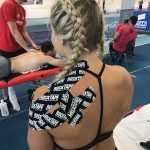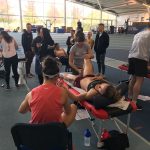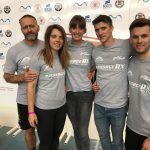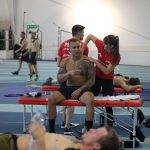A Weekend in the Life of Athlete Services at the IF3 World Championships
By Sophie Warner, MassageRX
Athlete Services has typically been a discrete service, one that sits in a quiet side room away from the competition floor, where a steady stream of athletes sidle in and out. It’s a privileged place where conversations take place that otherwise don’t get heard and where often, away from the noise and chaos of the competition floor, we see athletes when they’re stripped of all their machismo. In the relative calm, we get to see them struggle with their demons or recount the thrills of hitting a PB or outperforming even their own galactic expectations.
Because Athlete Services is often off limits to fans (which incidentally in Functional Fitness and CrossFit are almost unequivocally the fittest fans in sport), this blog quietly aims to give you a snapshot of what we at MassageRX get up to over a weekend of competition and we hope to give you some ideas of how you, as an athlete or competitor, can maximise your own recovery strategy after your regular training or at events you attend.
As Therapists, the vast majority of our time is ordinarily spent in Clinic, treating ongoing injuries, helping our clients to recover well and to keep working with them towards achieving their own personal sporting and athletic goals and objectives. It’s interesting work and it is undoubtedly extremely rewarding, but if offers us as Therapists the gift of time.
For most of us, there is no requirement to get up and perform at our absolute best, against the best, time after time over a period of 60 hours, so maximising recovery, although sensible, isn’t necessarily crucial. But at the recent International Fitness Federation (IF3) World Championships, where 150 of the planet’s most elite Athletes descended upon London; enabling the Athletes to recover faster, maintain their mental acuity and maximise their performance over the 6 gruelling tests held over 3 days, made treatment services absolutely critical and Athlete Services were unquestionably on the front line.
Here’s a run-down of the top 5 things you should expect from your World Class Athlete Services Team:
1 Managing Your Psychological Status / Treating the Brain
Often, in the heat of competition, you come to Athlete Services barely knowing what it is your body needs.
It might be that you’ve experienced some discomfort in the preceding event that worried you or that you are just not feeling yourself; perhaps you’re feeling fatigued and in need of being revived and given the confidence to get up and go again. What we saw at IF3 was not dissimilar to this, and although the athletes were a crazy level of World Class, the human underneath it all is still the same, regardless of our relative fitness or fame.
As the athlete arrives with us, we get a garbled, endorphin fuelled shopping list of ailments, rattled off in the staccato of gunfire, from a tired and sweaty human who’s wrestling to get free of their knee sleeves or wrist supports. It goes something along the lines of “Can you do my legs, and my shoulders, and my right forearm hurts just here [pointing] and I’ve got impingement syndrome in my hip and … my calves are tight and I’ve got pistols next … and I need to get food on board before I warm up for the next event in, errr, Christ! 45 minutes…”
Whilst looking into the pinpoint sized pupils of their frenetic eyes, and whilst trying to decipher the message, we immediately and discretely assess you as a whole person.
It’s not just about listening to what you are telling us about your body, but it’s about seeing what message your body language and energy tells us. The body is an intricate system and if we are to affect change for you and allow you to feel better when you leave, we need to be able to see as much of the whole bio-psycho-social model as we can in the soupçon of time available. It’s not simply about taping, Compexing, Hypervolting and massaging (else everyone would be doing it, right?). So the therapist is immediately trying to work out what the best approach for you might be in the time available.
For example, when a member of Team USA came to us directly from the competition floor, with his head spinning because of a misunderstanding around the time cap for his Heat of the Mixed Modal Test 5, it was our job to not only treat, but to also listen and facilitate his preparation for the next test. For him, it was all about taking the time to down regulate everything. Giving him the chance to lie still, for his body to reset towards homeostasis, for his mind to quieten down after the sheer confusion of not knowing when the event was sanctioned to end, and to inwardly digest and process the aftermath of a mistake that looked likely to have cost him a much sought after place on the podium.
Alongside this, it was about managing his immediate environment and the Team who were surrounding him by offering his Coach a chair and the chance to sit down beside the massage couch and talk to his athlete calmly, rather than leave him pacing up and down and speaking to his athlete, who’s lying prone on the couch, from the lofty height of his 6’ 3” frame. By offering these small adjustments to the ‘feng shui’ of the athletes’ personal space, and by reiterating a theme of calm whilst they’re in our care, we can try wherever possible to ensure that he is benefitting as much as he can from the treatment we are providing.
If you remain tense and wired on the massage couch, there’s a good chance that you’ll continue to be tense and wired by the time you leave it too.
2. Delaying Fatigue and Maximising Muscle Balance
It’s not all about managing injury, although that does take up a good proportion of our time. In competition, the challenge is to allow you to sustain a level of intensity across a time domain that is far longer than your normal training stimulus. When you’re competing at the World Championship level and proudly representing your Country, you are absolutely at the cutting edge of performance and every second and every last twitch of muscle fibre truly does count.
So when overall fatigue comes into play in an event that requires you to concentrate and display huge neuromuscular control – such as the quadruple 20m handstand walk which became progressively harder after each round, interspersed with L Hang pull-ups that was the IF3 Bodyweight Skill Test 4, you need every resource available to you to help counter the tiredness that your muscles and central nervous system are still experiencing after Tests 1, 2 and 3.
Have you ever tried balancing on one leg after a really stressful day or after a sleep deprived night? It’s so much more difficult than attempting the same feat when you’re well rested.The same goes for your muscles after a gruelling onslaught of workouts and your psyche after carrying the weight of flying the flag of your Nation for the whole weekend.
But there is a hack that’s available for just this situation that we use on Athletes in the melée of competition to help enable them to regain and sustain their neuromuscular control. For Test 4 we used RockTape almost exclusively on the shoulders, lower back wrists and forearms for added stability and, on the spiral line, for added control. The tape is brilliant at not only decompressing the tissues, to allow better drainage and to afford your nerves more room within which to function effectively, but it also seems to help to modulate the activation of your slow and fast twitch fibres, especially when potentially your fast twitch fibres have been pre-exhausted in earlier events.
So, by reminding your fast twitch and slow twitch to both get involved in unison, to decrease the incidence of fasciculation’s, when multiple efforts of handstand walking and maintaining your balance without error is required, it truly is a case of every little helps and from our experience, it’s amazing how tape can not only make a physical difference, but also give you a psychological boost when you’re giving everything you can, to be the best you possibly can, against fellow athletes that won’t give you an inch.
3. Sleep Enhancement
Because the IF3 was a 3 day competition, with Athletes travelling from all over the planet, our primary objective at the end of day 1 and day 2 was to offer all competitors the opportunity to enhance their sleep quality and supercharge their recovery.
Despite the team having provided treatments for 12 hours straight throughout the first day of the event, we were not going to leave the stadium until the last athlete had been through; even if that meant we were using matchsticks to keep our eyes open. With the first heat starting at 12.30pm and the last heat, which included the top ranked male athletes, heading out at 8.20pm in the evening it meant some of the competitors were finishing up at the venue at gone 10pm at night after the seriously intimidating challenge of a 5km Trail Run, 1k Row, 2k Ski Erg, 2k Trueform Run, 1k Row and 5km Assault Bike.
With a 75 minute time cap, and with some athletes suffering the effects of terrible cramp after racing to their limit on each new piece of equipment, the need to flush out muscles and reduce overall cortisol load to improve sleep quality was absolutely the priority for us.
From an Athlete Services perspective, we know that even before the stress of competing has begun that it’s hard to sleep in the relatively new environment of a hotel or Airbnb. We also know that any athlete who gets less than 6 hours of quality sleep will see their performance suffer the next day; by anything up to a 30% drop in the time it takes them to reach to physical exhaustion and in addition to this, we know that their injury risk will increase by up to 60%.
With these figures in mind, it makes winding down and recovering from what the day has thrown at you absolutely crucial. So our sole purpose on the first day of competition and towards the end of day two was to ensure that any perceived problems were being managed in two ways. Firstly,that we were there and able to help flush out muscles and kick start relaxation so that chances of good sleep were maximised and secondly, that performances on day 2 and day 3 were not being severely compromised by something as simple as not being able to switch off.
4. Managing Expectations – Injury Management
Elite athletes and particularly CrossFit and Functional Fitness Athletes are renowned for training and competing even when ill or injured. When you’ve trained your mental strength so acutely by visiting the notoriously titled ‘pain cave’ over years of pushing yourself to the limit on the gym floor, the prospect of stopping because your body appears to be failing you is often not even a consideration.
When an athlete hobbles, stumbles or arrives crestfallen with Athlete Services after suffering an injury or set back it is our job to assertively and expediently take control of the situation and give them the security and knowledge that we will do all we can to get them moving pain free once again. At the point that they sit on the massage couch we know that a myriad of motivations are running through their heads, and none more so than at a World Championships. We saw reflected in the eyes of the athlete their desperation to not let down their team, their coach, their family – all of whom have invested so much in order for them to just be here to compete.
But it’s hard. We will always do everything we can to offer the athlete all the support in the world, but juggling the balance between injury management and their personal performance ambitions is a difficult line to tread.
Thankfully at the World Championships we only had one incident of an athlete being forced to withdraw through injury and oftentimes the strain or discomfort felt on the competition floor can be resolved with targeted deep tissue work that’s subsequently reinforced with RockTape. We tend to always offer more than the athlete needs in this situation, in order to try to turn down their over stimulated nervous system. It’s key to encourage the body to feel safe and relaxed on the basis that if we can send messages to the brain to calm it down, we can then, hopefully allow that joint to move with more freedom and less pain.
The toughest part is nearly always talking to the person themselves. Trying to articulate a suspected injury in the rough and ready environment of the competition floor, in a way that still affords confidence, but nonetheless explains that they are unlikely to jump down from the massage table entirely pain free, is difficult. We absolutely don’t want to undermine anyone’s zeal to compete, and without access to primary care interventions like ultrasound or MRI’s we can at best guess what the injury is, but when the special tests suggest that something significant has gone wrong it’s then very much a case of damage limitation.
But aside from any treatment or words of support we can offer, it’s truly humbling watching an athlete accomplish themselves in a Final or in an event that had just hours or minutes earlier seemed out of their reach due to an unexpected injury or setback. It’s these moments that stand out as being special, not just for the treatment, but for the meeting of minds where both athlete and therapist are focused on the same singular outcome and when it’s not about flushing out or boosting recovery but effecting a real change that results in the athlete being rewarded on the competition floor. Those are the moments for me that make the world go round.
5. Bang for your Buck
As the Championships unfolded we were met with a growing queue of athletes waiting to be treated and seen, and at times, it’s safe to say that we had our work cut out trying to manage expectations and to get everyone waiting started on some form of rehab or prehab as quickly as possible.
Within the MassageRX team we have multiple tools in our toolkit and all the therapists and staff are aware of the importance of getting some form of treatment underway as soon as an athlete has signed and ticked all the boxes necessary on their consent form. In our experience, although the sometimes unavoidable wait is often welcomed by super tired humans who have been craving the opportunity to quietly, stare effortlessly into the distance and do nothing; every athlete feels more supported when they feel that they’re doing something to expedite their recovery.
This seems to be something unique to CrossFit and Functional Fitness athletes – their fundamental inability to sit still or to take a back seat on their best interests. Being hyper alert and informed is endemic within the sport and it’s never more evident than in the high intensity environment of a competition.
So within MassageRX we make the most of both new products like the RockPods and RockFloss as well as the time trusted RockBlades, Compex and Hypervolt to enable us to offer treatment services seamlessly to athletes whilst they wait.
By introducing these easy to use, but powerful bits of kit, to the patiently waiting athlete they can immediately access some care and, as a helpful byproduct, they feel like they’re taking charge of their own recovery. Particularly with the RockPods we saw great results by applying them to traps, scalenes, upper back and elbows over the World Championships weekend.
Alongside all of this, it’s always truly wonderful to meet all of the amazing people who are involved and are passionate about their sport. We all have a different story to tell and when you have Athletes travelling from across the globe to put their capabilities to the test, it is a real honour to be involved in some small way.
Whether that be offering a hug and some chocolate to console the athlete who’s distraught about her performance, taking time out to treat the Coach who’s given every last molecule of energy to his team, giving the exhausted athlete who’s left his soul on the competition floor an extra ten minutes on the massage couch to help him recover stronger, taping the many ripped, sore and bloodied hands or just making someone smile, it’s with genuine pride that we get to help you get the most from your body when you push it to the limits.
Until next time, signing out to you from Athlete Services with love,
Sophie.
Treat, Compete, Repeat.




